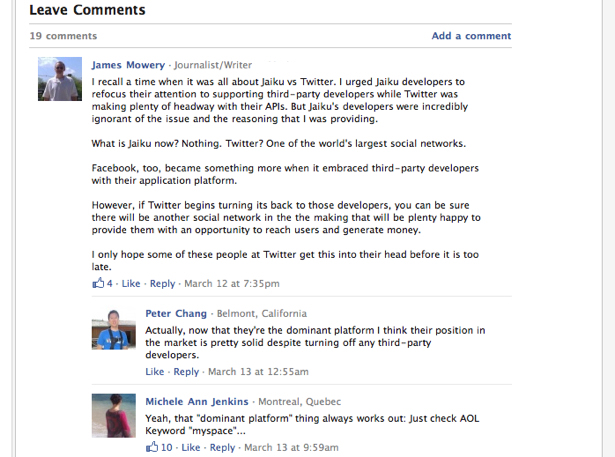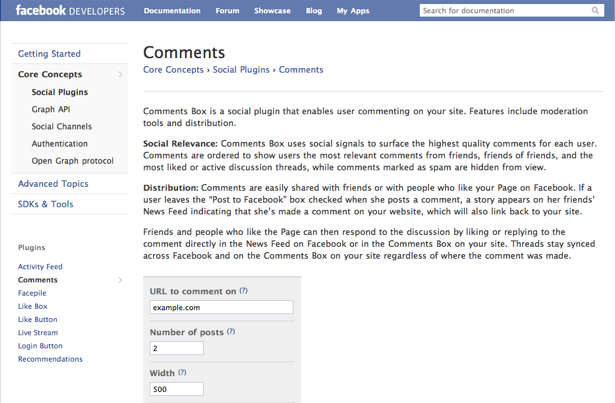
Facebook Comments is a recently released plug-in commenting system by Facebook that allows commenters to use their Facebook identity to post comments on content around the Web.
And as simple and innocent as that sounds, it has caused an uproar throughout the Web.
You'd think it was the end of the Internet itself! But people must realize that the Internet will still function as it always has, with or without Facebook Comments. It just might be more civilized place, which isn't a bad thing.
So, why all the drama? Well, it's because Facebook Comments eliminates something that quite a few people on the Internet clamor for: anonymity. It's important in many ways. But anonymity comes with a price, and that comes in the form of an overall poorer experience in online interaction. But does that alone justify the elimination of anonymity?
It's complicated. But the real question of the matter is simple: will the Web be better or worse with this new commenting system? That is what we are trying to figure out.
Introducing Facebook Comments
Facebook Comments, like everything else Facebook creates, received plenty of media attention. But it was difficult to understand just what Facebook Comments was because no one noteworthy was using it up until recently. I, for one, didn't think it was going to be a big deal at first. I likened it to the Facebook "Like" button or the Facebook "Share" buttons found around the Web; it would just be there, and some people would use it to help build interaction around a piece of content. No harm, no foul.
Clearly, I was wrong.
TechCrunch was the first major Internet property to adopt Facebook Comments that I heard about. And even though I heard about it, I didn't actually bother checking it out; I guess you could say I don't really bother reading comments on blogs much any more, for reasons that will become apparent soon.
But I did eventually read an article on TechCrunch that I liked and wanted to post a response to. I went to the page, scrolled down, and was greeted by a sight that actually blew me away: there were comments only by Facebook users. There were full names, profile pics, and everything! Why this surprised me, I'm not so sure. But there it was. And then it hit me: this is much bigger deal than I had initially given credence to.

I had typed out a comment that wasn't necessarily critical or impressive by any means, but it was one that I knew would spur on discussion. And for some reason that made me think twice about pressing the submit button — I was actually thinking long and hard about what I was posting, because, unlike before, everyone was seeing what I was publishing, and they would know exactly who I was, what my name was, what I looked like, and what my online identity was.
In one single moment, Facebook made it so that posting any single comment was to put your credibility and entire online persona on the line. Talk about pressure, gosh.
It was both thrilling and concerning at the same time. What kind of response would I get? Would people call me out? Would my job be in jeopardy? Would this come back to haunt me in the future? All this for a normal comment that wasn't even critical of the author's article.
It got me thinking that maybe this is bad...
Why Facebook Comments is bad
Anonymity is something that is highly valued in a world with little to no privacy. How can people function if every little thing they do online is tracked and able to be exposed to the world? Sure, there are things that should not be do done online that deserved to be exposed, but there is much more done online that deserves to be kept anonymous.
Is the act of commenting on a piece of work one of those things?
Taken from the perspective of those who live in oppressive countries, something like anonymity is cherished. What if an online publication is posting false propaganda for their government? Shouldn't it be a right for those citizens to comment on the content in question and let others know what they think? Of course, posting anything negative about a government in some countries could land you in jail, but this is more about the premise of anonymity than anything else.

Or how about in the land of the free, where magazines and news organizations have typically allowed open commenting. What if a user wants to comment on a story but doesn't want to reveal their identity? What if there is additional information that a user wants to contribute but doesn't want to reveal their identity? What if there is a controversial comment that must be made that is true, but the person in question doesn't want to be negatively affected because of it?
How about a piece of information that is published that someone disagrees with? Maybe the person wants to voice their opinion, but they don't want other people to know who they are? Without this anonymity, people could be encouraged to restrain themselves, just because they know they can't be completely open about something because of the potential consequences.
In scenarios like those, you can see where anonymity is important. It is crucial because it allows information to be truly free without consequence. To take that away is controversial.
It is also worth pointing out that Facebook Comments will more than likely result in a significant decrease in commenting activity. For TechCrunch, there was nearly a 50-percent reduction. As for which portion of "good" comments remained and "bad" comments — depending on your definition of "good" and "bad" — were eliminated, though, is uncertain.
I'm sure there are numerous other examples of why Facebook Comments could be considered a bad thing for the Web (feel free to share them in the comments below). However, I think everyone understands why this aspect of anonymity is important and why Facebook Comments can be perceived as a bad thing for the open Web.
But for all the negative things that could be said, there is plenty of good to come with the development of Facebook Comments and the unmasking of anonymous commenting.
Why Facebook Comments is good
If you want to see a prime example of a reason for a system like Facebook Comments, you need not look far. Take a stroll over to YouTube, and check out the comments section for almost any video with a few hundred or thousand views. Some of the most god-awful things can be said in those comments — I would know, as I used to publish YouTube videos on a regular basis in the past.
I'm willing to bet that a majority of those YouTube comments are no more than a sentence or two long, and that most of them say hateful things. Some of the more common themes I see is sexism, racism, and plenty of idiocy to boot. There is nothing constructive about most of these negative comments, and they only serve to add trash to the Web.
But what would happen if you took away the existing commenting system and replaced it with Facebook Comments (theoretically, anyways). Would there be less hatred and negativity? Probably. Would there be a dramatic decrease in sexism and racism? Plausibly. Would it result in a much more welcoming experience? You get the idea...
Facebook Comments would result in a more constructive conversation surrounding online content. In fact, WatchingWebsites found that people actually shared more content when Facebook Comments was being used.
People liked content more often. This probably led to a greater number of incoming visits from FB.com, but I don’t have the analytics to prove it. Both Erick and MG have stated that FB referrals have skyrocketed.
However, the report also noted that there was a slight decrease in the amount of retweets that content received after the switch to Facebook Comments. Keep that in mind if your website relies heavily on Twitter sharing.
Who should use Facebook Comments
WatchingWebsites offered some advice for content publishers about whether or not Facebook Comments would be appropriate for them. For the larger websites that need to take control of spam, they recommend giving Facebook Comments a shot and evaluating the effects after a month of usage. For low- to medium-sized websites, especially those seeking to acquire new readership, they recommend sticking with a commenting system like Disqus or Echo.
I agree with the advice to opt for Facebook Comments for those who are battling comment spam. This becomes even more important to larger websites, which is why it is not a shocker to learn that Hotels.com, TechCrunch, Examiner, L.A. Times Technology blog, and others are adopting the system.
But I have to disagree with the outright decision to forego Facebook Comments if you are a smaller publisher — even more so for individual bloggers.

For those who are looking to make genuine connections with their readers, Facebook Comments seems like an excellent tool to gain more insight into your readers. It gives bloggers more access to their readers — as they will know exactly who is responding to their content — and it also presents opportunity to create more connections through Facebook.
Quality vs. quantity
In the end, however, it is simply a question of weighing the importance of comment count versus comment quality. Facebook Comments is great option for those wanting better quality comments and more insight into their readers.
But Facebook Comments probably isn't the right solution for those who wish to have more comments and the option of enabling users to have anonymity. But for those who know that quality is what they seek, Facebook Comments is a great option.
Unfortunately, one post about this subject can't explore nor resolve all the potential issues that surround Facebook Comments. However, I hope that this article helps to guide publishers towards making a better, informed decision about the usage of Facebook Comments in the future.
Written exclusively for WDD byJames Mowery. He is a passionate technology journalist and entrepreneur who has written for various top-tier publications like Mashable and CMSWire. Follow him on Twitter: @JMowery.
What are your thoughts about Facebook comments? Please share below...















